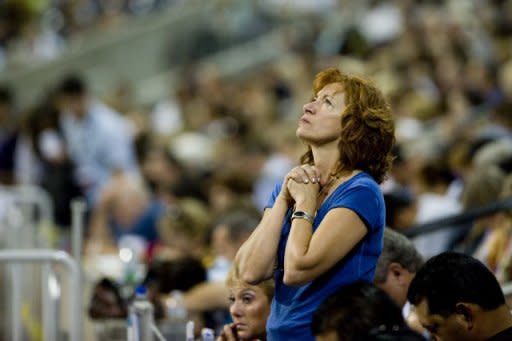Prayers, fasts as Texas governor preps presidential bid
Texas Governor Rick Perry, expected to launch a 2012 White House bid soon, rallied the faithful for a day of Christian prayer and fasting Saturday asking God to fix America's woes. "Father our hearts break for America," Perry prayed before a rapturous crowd of around 30,000 people gathered at a Houston stadium and thousands more watching via an online livestream. "We see discord at home, fear in the marketplace, anger in the halls of government and as a nation we have forgotten who made us, protects us, blesses us. For that we cry out for your forgiveness." The gathering is expected to burnish Perry's credentials among religious conservatives who shape Republican presidential primaries. But the blend of politics and piety could alienate swing voters thought to decide general US elections. Perry insisted that the event was apolitical, even as he asked God to impart "wisdom" on the president of the United States -- without mentioning Barack Obama's name -- and prayed that God would "inspire" the nation's leaders, pastors, generals, and parents in "difficult times." God's "agenda is not a political agenda. His agenda is a Salvation agenda," the Republican governor said, adding that "God is wise enough to not be affiliated with any political party." As streams of people filled the first, second and third levels of the stadium for the seven-hour event dubbed "The Response," they often stood with their hands waving fervently in the air, cried, sang, read passages from the Bible and swayed to the music. Shouts of "Hallelujah" could be heard throughout. Public shows of religious faith are nothing new to US politics -- George W. Bush said during the 2000 campaign that his favorite philosopher was Jesus Christ -- but at least one of the groups backing the event could raise eyebrows. The American Family Association, listed as a "hate group" by the Southern Poverty Law Center that tracks US extremists, rails against "the homosexual agenda" and accuses Obama of having "shown far more interest in promoting Islam than his own self-proclaimed Christian faith." But Barry Brummett, who studies the appeal of Evangelical religious discourse at the University of Texas at Austin, says Perry's public shows of faith are "not beyond what you might see a 'mainstream' political leader do anywhere." "Now if he kept doing this, started seeing visions and handling snakes, then people might say he's gone over the top," Brummett told AFP. James Henson, who directs the Texas Politics project at the University of Texas at Austin, said Perry is right to focus on religious conservatives, a potent force in early Republican contests. His "appeal to Evangelicals, which is what 'The Response' is, helps him in the primary or they wouldn't be doing it," said Henson, who noted Perry "hasn't hesitated" to use such appeals "for political reasons." Perry clearly had the approval of much of the crowd Saturday. "I would vote for him because he has Christian principles," said Thomas Kaden, 24, from Humble, Texas. "He stands to follow God and I am a supporter of that." Gabriel Allen, 42, of Houston, said there are a lot of reasons why she'd vote for Perry in the primary, but his decision to host the prayer meeting shows that he is both a leader and a man of the people. "I know that when a candidate is a person of faith he'll put everyone's interests first and really be a servant for others," she told AFP. "That's why faith is so important to me." Two of Perry's rivals face balancing acts of their own when it comes to religion: former governors Mitt Romney of Massachusetts, the Republican frontrunner, and Jon Huntsman of Utah are Mormons. Some Republicans fret that Evangelical Christian voters will not support a Mormon candidate, though others counter that a sour economy and fierce opposition to Obama will rally the party in 15 months. The latest polls show Romney with a decisive lead among Republican candidates ahead of primaries set to be held early next year, with 21.6 percent support according to a Real Clear Politics average of recent polls. Representative Michele Bachmann of Minnesota, a darling of the "Tea Party" movement and evangelicals alike, is in second place at 13.2 percent, while Perry -- who has yet to formally declare his candidacy -- is nipping at her heels with 12.6 percent. The November 2012 election is expected to turn on Obama's handling of the economy, and Perry could be expected to trumpet the robust job growth of the "Texas Miracle" he has overseen since taking office in 2000. But critics of Perry point out that his state has high rates of poverty, and he would likely face fire over telling an anti-tax "Tea Party" rally in April 2009 that Texas might be better off seceding from United States.





